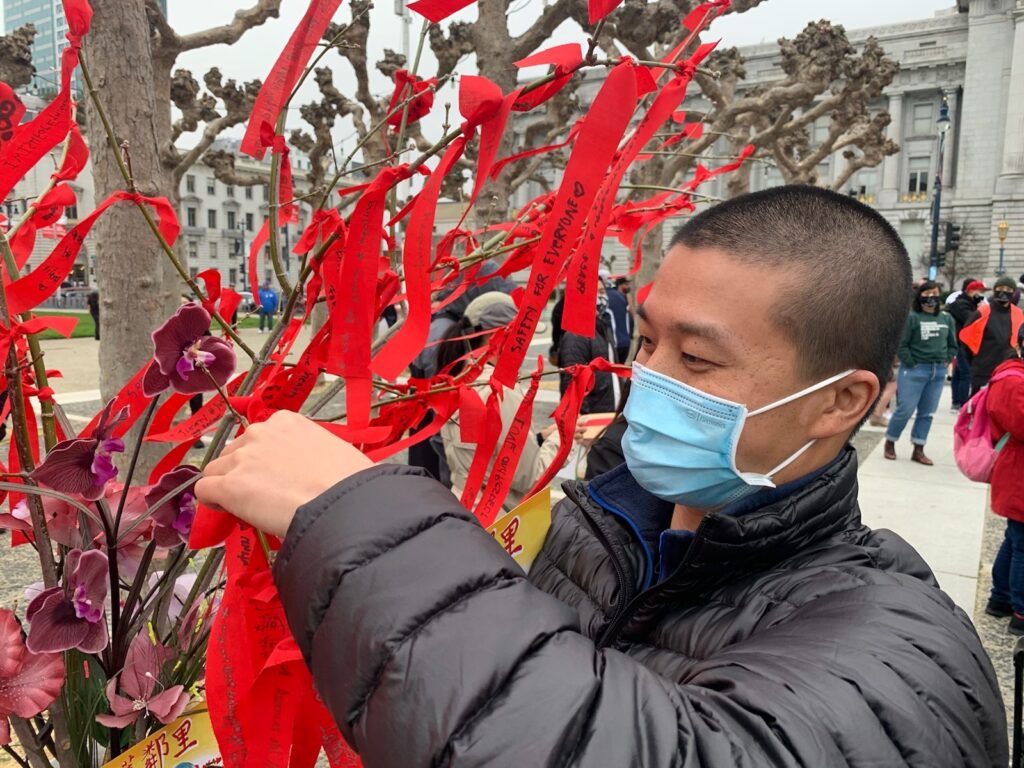Roughly 200 people gathered at San Francisco’s Civic Center Plaza outside City Hall on Valentine’s Day to offer a space for community healing and to call for more investment in community-based public-safety solutions for Asian-American neighborhoods.
Recent attacks against elderly Asian-Americans in the Bay Area have rekindled collective trauma for those communities brought about by a wave of xenophobic hate crimes since the onset of the pandemic. It’s still unclear whether the recent attacks against Asian-American elders, including 84 year-old San Francisco man Vicha Ratanapakdee on Jan 28 and a 91-year-old Oakland man on Jan 31, were racially motivated. But Lai Wa Wu, spokesperson for the Chinese Progressive Association, which co-organized the rally, said that the fact that these violent attacks continue to occur against Asian-Americans demonstrate the need for investment in public safety solutions for those communities.

“We cannot guarantee whether [the attackers] were racially-motivated or not, but the impact is still the same; it is devastating to witness people who are particularly vulnerable to be bullied and assaulted,” said Wu. “It was not too long ago we had a president that scapegoated Asian-American communities for [COVID] and racism [against Asian-Americans] has persisted since even before Trump.”
There have been 708 hate crime incidents in the Bay Area during the pandemic, according to Stop AAPI (Asian-American and Pacific Islander) Hate, a project by SF State to track hate crimes against Asian-Americans and Pacific Islanders.
Of those 708 incidents, 292 took place in San Francisco, the most of any Bay Area city. And the number of hate incidents reported is likely more conservative than reality.
While some have called for increased police foot patrols and ride-alongs to bolster public safety, Wu said that community-based public safety solutions are better-suited for keeping Asian-American communities safe because they involve volunteers who are trained to resolve conflicts non-violently more effectively than police, as well as offering same-language services for non-English speakers.
“While we appreciate the intention of people wanting to come together to patrol our streets, they can be problematic if these people are not trained to avoid racial profiling, conflict mediation, and de-escalation in moments of crisis. We also need to make sure that these programs are culturally responsive to our communities,” said Wu.
One way to provide culturally responsive resources to Asian-American communities, according to Eddy Zheng, founder and executive director of New Breath Foundation, an Oakland nonprofit which advocates for finding and resources towards AAPI communities who have been incarcerated or faced deportation, is to expand funding for existing city-sanctioned programs such as San Francisco’s Community Ambassador Program and the Street Violence Intervention Program.
These programs, which stem from the Office of Civic Engagement and Immigrant Affairs and the Mayor’s Office, use volunteers trained in de-escalation and other non-violent tactics to resolve conflicts and to provide a community presence to deter crime.
Zheng said that further investment in these programs would allow them to recruit volunteers with skills in other languages, including Cantonese and Mandarin, to improve community access to resources and allow these groups to operate effectively in AAPI neighborhoods. That’s especially important because these communities are often disproportionately impoverished, according to Zheng.
“We want to center our survivors and get the language access that they need, and to invest in community ambassadors. We want the city to expand the Street Violence Intervention Program to hire Chinese speakers to support our community because Asian-Americans make up 35 percent of San Francisco and yet we make up 42 percent of the city’s impoverished, said Zheng. “People don’t know that because of the model minority myth, they think we are smart at math and we drive Teslas and BMWs, but what about the folks who were formerly incarcerated? We need to invest in our communities and build bridges… We need to tap into our chi,” said Zheng, who is formerly incarcerated himself.
According to Wu, disproportionate poverty rates, lack of affordable housing, and lack of access to healthcare are some of the issue that are drivers of crime in AAPI communities in the Bay Area. Wu said that to sustainably bolster public safety in these neighborhoods, Bay Area cities must address these root causes of crime.
“We need our city to recognize that cause of violence is not just interpersonal, it is about housing disparities, underemployment, lack of healthcare. We have to provide resources to address those root causes as well,” said Wu.
While SFPD refused to comment on crime rates or the kind of crimes which occur in APPI communities, including Chinatown, Max Leung, an SF native and founder of SF Peace Collective, a volunteer group that patrols Chinatown to deter crime, said that the most common form of crime is robbery.
“In Chinatown it’s robberies, mostly strong-arm robberies happening,” said Leung.
For Leung, a long-term solution to crime is even more fundamental, and goes beyond just providing resources to the vulnerable.
“I created [SF Peace Collective] about a year ago, but I’m saddened I have to do that. It’s not a sustainable solution…What I know is missing is that we need to perpetuate a culture of compassion, kindness, and respect. That’s missing in society right now. Until we have that, at the end of the day, we are still going to keep recycling these toxic negative behaviors.”






